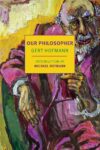In the United States, the number of books published in translation is famously low. A popular estimate is 3% of all literary fiction and poetry. A translator’s name is usually included in small print on the title page of a printed book — rarely on the cover — and even the most prolific translators often remain in the shadows. Many people can name a favorite author, but how many of us have a favorite translator?
Yet despite having a job that, by nature, goes relatively unseen, translators wield incredible power. They are, in a sense, trusted to write anew the great works of others. Nobel prize winner José Saramago once said, “World literature is created by translators.” And the stakes are high indeed: the 1989 fatwa calling for Salman Rushdie’s death in response to the publication of The Satanic Verses led to the murder of Rushdie’s Japanese translator and the attempted assassinations of his Italian, Norwegian, and Turkish translators.
Even on the page itself, a translation can mean the difference between life and death: Constance Garnett, who was responsible for bringing Tolstoy, Dostoyevsky, and Chekhov to English readers in the early 20th century, worked so quickly that she had a habit of skipping or changing lines that gave her trouble. A 2005 New Yorker article describes Nabokov’s reaction to a Garnett translation: “where a passage in the Garnett of ‘Anna [Karenina]’ reads, ‘Holding his head bent down before him,’ Nabokov triumphantly notes, ‘Mark that Mrs. Garnett has decapitated the man.’ ”
For translators long familiar with the paradoxical work that is literary translation, and for the rest of us to whom such travails are wholly unfamiliar, we sought to ask a wide swath of translators about their work. From those working in Icelandic to those translating from French, from those just beginning their careers to those long-established, we survey the ferrymen and women who battle the tide to bring literature to foreign shores.
For more responses to our questionnaire, click here.
* * *
 Michael Emmerich is associate professor of Japanese literature at UCLA. He is the author of The Tale of Genji: Translation, Canonization, and World Literature; the editor of Read Real Japanese Fiction and New Penguin Parallel Texts: Shorts Stories in Japanese; and the translator of more than a dozen books from Japanese, most recently Inoue Yasushi’s Bullfight, The Hunting Gun, and Life of a Counterfeiter (all published by Pushkin Press).
Michael Emmerich is associate professor of Japanese literature at UCLA. He is the author of The Tale of Genji: Translation, Canonization, and World Literature; the editor of Read Real Japanese Fiction and New Penguin Parallel Texts: Shorts Stories in Japanese; and the translator of more than a dozen books from Japanese, most recently Inoue Yasushi’s Bullfight, The Hunting Gun, and Life of a Counterfeiter (all published by Pushkin Press).
What is the most recent problem you ran into in a translation (a sentence, a word, a phrase)? How did you solve it?
Somehow “solving problems” doesn’t really seem to describe what I’m doing when I translate — if anything, the sentences, words, and phrases that require the most creativity and engagement (the trickiest bits, in other words) stand in my mind as the very best instances of translation, and anything that can be dealt with too easily, almost mechanically, presents the problem of boredom, to which the pleasures of translation are the answer.
One of the trickier things I’ve been having fun with lately is an issue that goes beyond the word, the phrase, or the sentence — how to take an essay written in Japanese by extraordinarily brilliant, subtle thinker and turn it into an Op-ed piece for the New York Times. The author, Katō Norihiro, knows what he wants to say, but he doesn’t necessarily say it in a manner congenial to an Op-ed. This means that I often have to “translate” not only the language, but also the structure of the argument itself — moving and even deleting paragraphs (Katō Norihiro intentionally writes a bit more than necessary so that I can condense as I see fit). Of course, this is only possible because he and I have a very close personal relationship, and he trusts me to find the best way I can to communicate what he most wants to say, with as much nuance as possible.
Translators have enormous power over a text. How do you respond to this power? Can translation ever be unethical?
I’m not sure that translators have all that much power over texts themselves — even the texts of our own translations are often subject to revisions and rewritings about which we don’t always have the last say, and of course readers are free to do what they like with our translations, just as they are free to do what they like with original texts. At most we have the power to guide readers’ experience of a text by presenting a certain, possibly idiosyncratic interpretation of it — in the sense that Glenn Gould offered his own “interpretations” of Bach — and if this interpretation is persuasive enough, it may come to be accorded a level of respect that equals or even trumps that of the original on which it was based. But that is merely to say that a translation can have a lot of power — not that it has power of the original, unless the author ends up editing it based on the translation, which occurs more frequently than some may imagine.
I suppose, though, that there is a sense in which a translator can at least potentially have great power over a text: she can choose not to translate it. If, as a result, a publisher that had showed interest in issuing a translation decides not to, then the text may never be translated, and in the long term this may decrease the chances that it will survive longer than a few years, say, even in the language in which it was written. Conversely, choosing to translate a text can help bring it to the attention of more readers even in its original language.
I suppose I tend to be most focused on the power a text has over me — and on striving my hardest to create a text in English that has the same power over me.
I do think translation can be unethical, in many ways. A few years ago, I myself engaged in what I now consider an unethical translation project. There was nothing ethically dubious about the content of the translation itself, but rather in the act of publishing it as it was published: the terms of the contract were so abominably bad that in retrospect my acceptance of them seems to me to constitute a betrayal of other translators. At the time, I thought the book was so good that I could afford to sacrifice a bit — I have a day job as an academic, after all, and no one really expects to make a lot of money off literary translation, right? It’s a labor of love! This attitude, I now see, is unethical. We should not make any sacrifices for great literature, because when we do, we are indirectly hurting other translators by devaluing the work we all do.
There’s that famous Italian expression, “Traduttore, traditore” (a play on the words for “translator” and “traitor”). And the poet and translator Rosmarie Waldrop writes, “Translating is not pouring wine from one bottle into another. Substance and form cannot be separated easily . . . Translation is more like wrenching a soul from its body and luring it into a different one. It means killing.” Why is it that the concept of translation can inspire such violent comparisons? To what extent does your own translation work feel like an act of destruction?
I’m not sure I see the difference between pouring wine from one bottle into another and luring a soul from one body into another, at least in terms of the old form–substance dichotomy. And I certainly don’t see why one should have to kill a person in order to lure her soul out and coax it into another body. Much better, I would think, to appeal to the wonders of marketing: “Take a look at this, Soul. Brand new body. See the color in those cheeks! Listen to that heart pumping away inside! Not like that old clunker you’ve got now . . . what year is that one you got there anyway — it’s like a ’38 or something, right?”
At any rate, I suspect the reason people speak of translation in such violent terms has less to do with anything intrinsic to the concept of translation itself (or rather to the innumerable different concepts of translation that are in circulation around the world) than with the contexts in which translation is practiced — contexts that include, of course, power imbalances on scales both large and small, and the myriad acts of violence, small and large, in which these imbalances manifest themselves. If anything, it seems to me that translation should work against such ills, helping to promote exchanges, conversations, and interactions that are, as much as possible, equal.
The word “faithful” often comes up in discussions of translation. To whom or what is a translation faithful? Is a faithful translation good? Is a good translation faithful?
I believe a good translation is faithful to the translator’s most careful, attentive experience of the text or book she is translating. Not all faithful translations are good, however. In order for a faithful translation to be good, the person who did it has to be a good translator.
When do you know that a translation is finished?
A translation is finished when no one reads it anymore.
What kinds of books and genres in your source language(s) are translated into English most often? What are the books, genres, styles that you would most like to have translated?
After manga, which undoubtedly tops the list, novels and short stories are the predictable favorites, though poetry also does fairly well. Lately there has even been a small surge in the translation of criticism. I would like to see more novellas and more non-fiction.
Why do you translate?
For the same reason I recommend books I care about to people I care about: to share. And also because translation is the only activity I know that allows me not merely to brush up against feelings, sensations, and memories that are called up by language but exist outside it, but to focus on and burrow into those feelings, sensations, and memories. In his perhaps overly famous essay “The Task of the Translator,” Walter Benjamin suggests, via his translator Harry Zohn, that translations elevate their originals into “a higher and purer linguistic air.” To me, this seems to describe the feeling of translating: when we translate, if only for a time, we breathe that special air. And that air is addictive.
This post may contain affiliate links.







